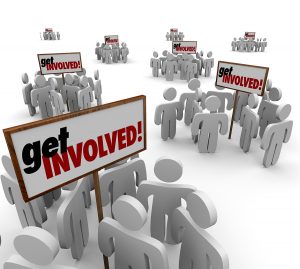 Social facilitation, or the audience effect, is defined as the tendency for people to act differently with an audience than when they’re alone. With social media, people always have an audience. Media and politics are giving us permission to act – online and in person — in ways that we haven’t experienced before.
Social facilitation, or the audience effect, is defined as the tendency for people to act differently with an audience than when they’re alone. With social media, people always have an audience. Media and politics are giving us permission to act – online and in person — in ways that we haven’t experienced before.
We are, it seems, at a challenging point in history. I cannot recall a time when we have seemed more deeply divided as a country. For reasons we all understand, there is little appetite for conversation about many topics that divide us. We like expressing our anonymous opinions, but we are shrinking from participating in discussions that are difficult just as those discussions have become essential. What will the next year, or four years, mean for us as a nation? Some are patting themselves on the back over their recent win while others prepare to fight, through means including petitions, civil disobedience, and application of pressure on moderate elected officials. Are we destined to a prolonged clash of ideas?
Relative to social facilitation, acting differently with an audience means speaking differently in groups of people. Those of us with the skill set for bringing people together must rise to the occasion of applying our skills to managing civil discourse.
We all know that debates have winners and losers, based on the strength of the argument. Debaters win by arguing more forcefully, framing stronger arguments, finding flaws in the opponents’ views, and developing more sophisticated defenses to their positions. Winners rule the day, even if they win by only the narrowest of margins. But the result is hardly satisfactory for all. Coherent, sustainable public policy requires a much higher bar; more pervasive an agreement than that. Debate cannot produce consensus. And sound public policy really needs consensus for sustained implementation.
Dialogue, by contrast, works when people agree to suspend the assumption that one side will win. Successful collaborative processes become possible when participants agree that all perspectives must be accommodated; when all agree that each person’s unique views are necessary to create a comprehensive understanding of the whole. Allowing this to take place means managing the audience effect, or social facilitation.
Examining the etymology of words can sometimes reveal meanings that we have somehow forgotten. The historical definition of the word “communicate”, for example, suggests that the word originally meant “to share, divide out; communicate, impart, inform; join, unite, participate in,” and perhaps most interestingly, “to make common.” In other words, the word was originally used to describe the process by which knowledge is shared for the explicit purpose of informing a collective understanding.
What is the role of the facilitator within this context? We must establish a safe environment for difficult conversations. That means starting every meeting with a clear explanation of the purpose, a realistic agenda focused on the meeting objectives, and ground rules to support respectful conversations. But that is just the beginning.
We must help groups understand that they need to move beyond debate in order to have the ability to define solutions that work for everyone, not just the fortunate few. We need to talk, with confidence and optimism about what can be accomplished if groups agree to participate in something more genuine than just making their loudest argument. Through deep listening and adequate time, groups can develop a richer, more nuanced understanding of the problems they seek to solve. Through respectful dialogue and face-to-face contact, not only will they learn how others see things, but also develop empathy for other perspectives. Only then can solutions emerge that were not initially evident to anyone, yet everyone can support. Along the way, genuine listening not only informs the collective wisdom, but allows everyone to change their thinking.
This works when people are willing to listen, to accept that their own views are not necessarily better than others’ views but rather one piece of the puzzle. What we discover while we work together becomes much bigger than any of us could define independently.
I believe much is possible when people are willing to listen. My faith in the possibility of that outcome must be evident when I facilitate. I must bring hope to each conversation, and translate that hope for others. If I am going to call myself a facilitator, I owe each group nothing less.
For a longer and more thorough discussion of these ideas and more, see Maria Popova’s article entitled “Legendary Physicist David Bohm on the Paradox of Communication, the Crucial Difference Between Discussion and Dialogue, and What Is Keeping Us from Listening to One Another” at https://www.brainpickings.org/2016/12/05/david-bohm-on-dialogue/
Author: Wendy Lowe
